同义、近义词、词组
高考英语同义、近义词、词组难点分析
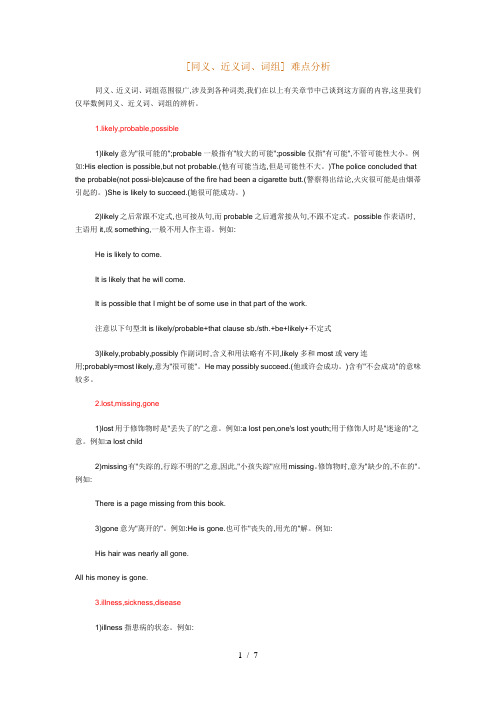
[同义、近义词、词组] 难点分析同义、近义词、词组范围很广,涉及到各种词类,我们在以上有关章节中已谈到这方面的内容,这里我们仅举数例同义、近义词、词组的辨析。
1.likely,probable,possible1)likely意为"很可能的";probable一般指有"较大的可能";possible仅指"有可能",不管可能性大小。
例如:His election is possible,but not probable.(他有可能当选,但是可能性不大。
)The police concluded that the probable(not possi-ble)cause of the fire had been a cigarette butt.(警察得出结论,火灾很可能是由烟蒂引起的。
)She is likely to succeed.(她很可能成功。
)2)likely之后常跟不定式,也可接从句,而probable之后通常接从句,不跟不定式。
possible作表语时,主语用it,或something,一般不用人作主语。
例如:He is likely to come.It is likely that he will come.It is possible that I might be of some use in that part of the work.注意以下句型:It is likely/probable+that clause sb./sth.+be+likely+不定式3)likely,probably,possibly作副词时,含义和用法略有不同,likely多和most或very连用;probably=most likely,意为"很可能"。
He may possibly succeed.(他或许会成功。
初中英语近义词、同义词、词组、短语辨析大全 同义词辨析 第12组
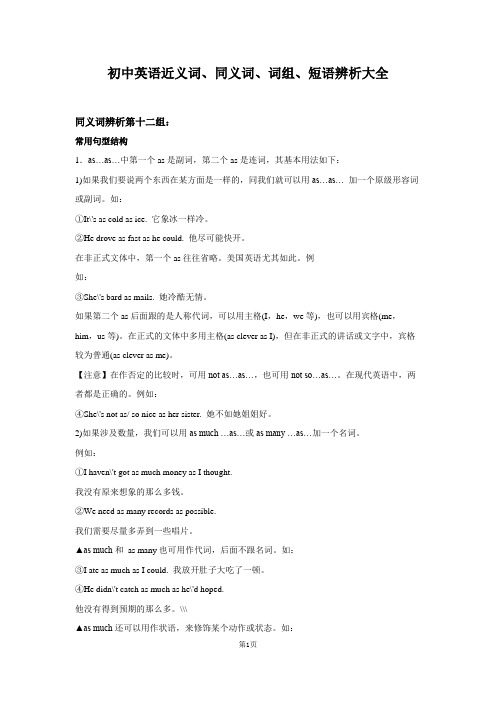
初中英语近义词、同义词、词组、短语辨析大全同义词辨析第十二组:常用句型结构1.as…as…中第一个as是副词,第二个as是连词,其基本用法如下:1)如果我们要说两个东西在某方面是一样的,同我们就可以用as…as… 加一个原级形容词或副词。
如:①It\'s as cold as ice. 它象冰一样冷。
②He drove as fast as he could. 他尽可能快开。
在非正式文体中,第一个as往往省略。
美国英语尤其如此。
例如:③She\'s bard as mails. 她冷酷无情。
如果第二个as后面跟的是人称代词,可以用主格(I,he,we等),也可以用宾格(me,him,us等)。
在正式的文体中多用主格(as clever as I),但在非正式的讲话或文字中,宾格较为普通(as clever as me)。
【注意】在作否定的比较时,可用not as…as…,也可用not so…as…。
在现代英语中,两者都是正确的。
例如:④She\'s not as/ so nice as her sister. 她不如她姐姐好。
2)如果涉及数量,我们可以用as much …as…或as many …as…加一个名词。
例如:①I haven\'t got as much money as I thought.我没有原来想象的那么多钱。
②We need as many records as possible.我们需要尽量多弄到一些唱片。
▲as much和as many也可用作代词,后面不跟名词。
如:③I ate as much as I could. 我放开肚子大吃了一顿。
④He didn\'t catch as much as he\'d hoped.他没有得到预期的那么多。
\\\▲as much还可以用作状语,来修饰某个动作或状态。
如:⑤You ought to rest as much as possible. 你应当尽量多休息。
常见英语同近义词同类词组

常见英语同近义词同类词组同义词是指意思相同或相近的词语,而同类词组则是指具有相同或相似的用法和结构的词组。
在学习英语的过程中,了解常见的英语同义词和同类词组对于拓展词汇量、丰富语言表达能力非常有帮助。
本文将介绍一些常见的英语同义词和同类词组,帮助读者更好地理解和运用这些词语。
1. Big - Large这两个词都表示“大”的概念,可以互换使用。
例如,可以说:“She has a big house”或者“she has a large house”。
2. Happy - Glad这两个词都表示“高兴”的意思。
可以说:“I'm happy to see you”或者“I'm glad to see you”。
3. Sad - Unhappy这两个词都表示“伤心的”或“不开心的”。
例如,可以说:“He looks sad”或者“He looks unhappy”。
4. Beautiful - Gorgeous这两个词都表示“美丽的”。
例如,可以说:“She is a beautiful woman”或者“She is a gorgeous woman”。
5. Tired - Exhausted这两个词都表示“疲倦的”。
例如,可以说:“I'm tired after a long day at work”或者“I'm exhausted after a long day at work”。
6. Start - Begin这两个词都表示“开始”。
可以说:“Let's start the meeting”或者“Let's begin the meeting”。
7. Help - Assist这两个词都表示“帮助”,可以互换使用。
例如,可以说:“Can you help me with this task?”或者“Can you assist me with this task?”8. Buy - Purchase这两个词都表示“购买”,可以互换使用。
一成不变的近义词同义词反义词字词解析

一成不变的近义词同义词反义词字词解析一成不变的近义词、同义词、反义词及字词解析"一成不变"是指某物或某种状态长时间保持不变的情况。
在汉语中,有许多近义词、同义词和反义词能够描述这种状态。
下面将对这些词语进行解析。
一、近义词1.恒常:常常用来表达某种状态始终保持不变,与"一成不变"意义相近。
例如:她的爱情观始终恒常,从未改变过。
2.坚定:通常描述信念、立场或决心始终如一,不会改变。
例如:他对自己的梦想保持着坚定不移的态度。
3.执着:用来表达坚定不移、持续不变的意思,多用于描述个人追求的对象或目标。
例如:他一直执着于追求自己的音乐梦想。
二、同义词1.固定:指某个事物、状况或习惯等无论时间、环境如何,始终保持不变。
例如:他每天上午九点钟准时到达办公室,这已经成为他的固定习惯。
2.经久不变:用来形容某种状态或情感长时间保持不变,持续存在。
例如:他们的友谊经久不变,无论时光怎样流转。
3.不变常态:强调某种状态长期保持不变,且成为常态,不会受到外界干扰。
例如:他的工作态度一直保持不变常态,总是全力以赴。
三、反义词1.多变:与"一成不变"意思相反,指某种状况或状态经常变化、不稳定。
例如:他的情绪多变,时而开心,时而沮丧。
2.变幻莫测:强调事物或情况的反复变化,无法预测,不能将其归类为"一成不变"。
例如:这个城市的天气变幻莫测,时晴时雨。
3.善变:形容个人态度或决定容易改变,缺乏稳定性。
例如:他做事善变,很难预测他下一步的行动。
四、字词解析1.一成不变:这个词组由"一"、"成"、"不变"构成。
表示某种状态或状况在数量、比率或规模上保持不变。
"一成"指百分之一,表示极小的比例。
2.近义词:指意义相近或相似的词语。
在解析中,我们介绍了与"一成不变"意义相近的词语,如恒常、坚定和执着。
词语拓展学会使用反义词
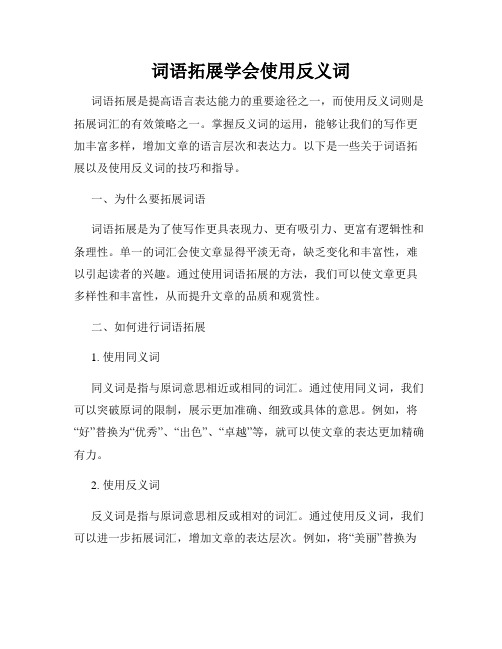
词语拓展学会使用反义词词语拓展是提高语言表达能力的重要途径之一,而使用反义词则是拓展词汇的有效策略之一。
掌握反义词的运用,能够让我们的写作更加丰富多样,增加文章的语言层次和表达力。
以下是一些关于词语拓展以及使用反义词的技巧和指导。
一、为什么要拓展词语词语拓展是为了使写作更具表现力、更有吸引力、更富有逻辑性和条理性。
单一的词汇会使文章显得平淡无奇,缺乏变化和丰富性,难以引起读者的兴趣。
通过使用词语拓展的方法,我们可以使文章更具多样性和丰富性,从而提升文章的品质和观赏性。
二、如何进行词语拓展1. 使用同义词同义词是指与原词意思相近或相同的词汇。
通过使用同义词,我们可以突破原词的限制,展示更加准确、细致或具体的意思。
例如,将“好”替换为“优秀”、“出色”、“卓越”等,就可以使文章的表达更加精确有力。
2. 使用反义词反义词是指与原词意思相反或相对的词汇。
通过使用反义词,我们可以进一步拓展词汇,增加文章的表达层次。
例如,将“美丽”替换为“丑陋”、“丑恶”,将“快乐”替换为“悲伤”、“痛苦”,就可以使文章更加丰富多样。
3. 使用近义词近义词是指与原词的意思相关或相近的词汇。
通过使用近义词,我们可以突出文章的细节和感觉,增加文章的动感和形象感。
例如,将“走”替换为“行走”、“步行”、“散步”、“奔跑”等,就能够使文章的描写更加生动有力。
4. 使用词组和惯用语词组和惯用语是一种特定的表达方式,具有独特的意义和习语。
通过使用词组和惯用语,我们可以在文章中增加一定的情感色彩和口语化的效果。
例如,将“非常好”替换为“太棒了”、“非常棒”、“棒极了”,将“非常累”替换为“筋疲力尽”、“精疲力竭”等,就能够增加文章的情绪表达和感染力。
三、正确运用反义词1. 辨别上下文和语境使用反义词要根据文章的具体语境和表达需要进行选择和运用。
要注意反义词的意思与原词的意思的确切相反,能够在文章中表达出我们想要表达的观点或情感。
2. 增加对比和矛盾使用反义词能够引出文章中的对比和矛盾,从而增加文章的悬念和吸引力。
同义词——精选推荐

同义词同义词、近义词、易混淆词:从汉语到中介语的视⾓转移*张博提要在汉语作为第⼆语⾔教学需求的驱动下,对外汉语教学界超越对同义词意义关系的传统关注,将词语辨析的范围扩⼤到⼴义的近义词,并在近义词的框架下进⾏易混淆词的辨析。
本⽂认为,这种做法难免冲犯近义词的界限,并使⼤量易混淆词受“近义”的规约⽽被悬搁。
因此,对外汉语教学中的词语辨析不宜固守“同义”“近义”这类汉语本体研究提供的标尺,应当转换视⾓,基于中介语词语偏误的现实更有针对性地进⾏易混淆词辨析。
易混淆词存在于第⼆语⾔学习者⽬的语使⽤和理解两个层⾯,既表现为⼝头表达和写作中的词语混⽤,也表现为阅读和听辨中的词语误解。
本⽂根据词语混淆的影响因素归纳了汉语中介语易混淆词的主要类型,并提出研究易混淆词需要注意的⼏个问题。
关键词同义词近义词易混淆词词语辨析词语辨析是对外汉语教学、学习词典编纂和教材词语注释及练习的重要内容。
在什么范围内进⾏词语辨析?如何选定辨析的词对或词群?这是对外汉语教学界关注已久、但仍需认真探讨的重要问题。
本⽂拟在考察对外汉语教学领域词语辨析研究进程的基础上,对此再作思考并提出⼀些建议。
⼀ “近义词”从“同义词”的笼罩下⾛出在词汇学研究领域,许多论著和教材都将同义词区分为“等义词”和“近义词”①,或者区分为“绝对同义词(absolute synonym)”和“相对同义词(relative synonym)”②。
等义词(或绝对同义词)意义完全相同,可在任何上下⽂中互相替换,因⽽没有辨析的必要。
需要辨析的是“虽然意义相同,但并不完全相等,有种种细微的差别,应⽤上也不能任意替换”(胡裕树主编,1981:260)的近义词。
近义词既是同义词的主体,⼜是“同义词”的次类,属于“⼴义上的同义词”(兹古斯塔,1968/1983:121),因此,辨析词典⼀般都以同义词为名,例如张志毅主编《简明同义词典》(1981)、刘叔新主编《现代汉语同义词词典》(1987)、商务印书馆辞书研究中⼼《新华同义词词典》(2003)等。
常见英语同近义词同类词组
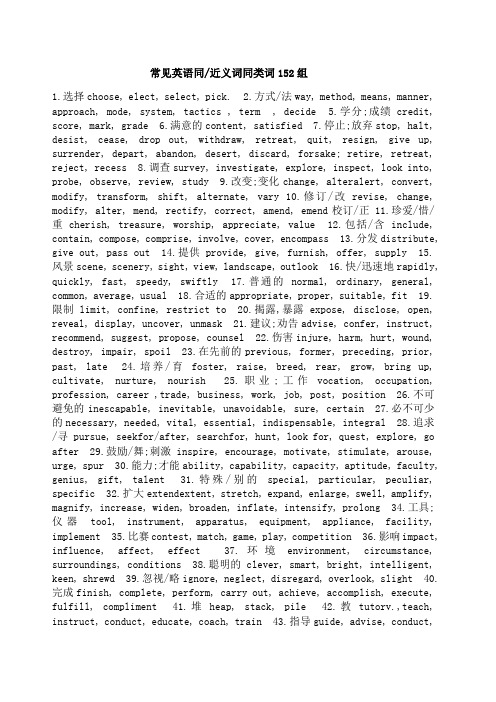
常见英语同/近义词同类词152组1.选择choose, elect, select, pick.2.方式/法way, method, means, manner, approach, mode, system, tactics , term , decide 5.学分;成绩credit, score, mark, grade 6.满意的content, satisfied 7.停止;放弃stop, halt, desist, cease, drop out, withdraw, retreat, quit, resign, give up, surrender, depart, abandon, desert, discard, forsake; retire, retreat, reject, recess 8.调查survey, investigate, explore, inspect, look into, probe, observe, review, study 9.改变;变化change, alteralert, convert, modify, transform, shift, alternate, vary 10.修订/改revise, change, modify, alter, mend, rectify, correct, amend, emend校订/正 11.珍爱/惜/重cherish, treasure, worship, appreciate, value 12.包括/含 include, contain, compose, comprise, involve, cover, encompass 13.分发distribute, give out, pass out 14.提供 provide, give, furnish, offer, supply 15.风景scene, scenery, sight, view, landscape, outlook 16.快/迅速地rapidly, quickly, fast, speedy, swiftly 17.普通的 normal, ordinary, general, common, average, usual 18.合适的appropriate, proper, suitable, fit 19.限制limit, confine, restrict to 20.揭露,暴露 expose, disclose, open, reveal, display, uncover, unmask 21.建议;劝告advise, confer, instruct, recommend, suggest, propose, counsel 22.伤害injure, harm, hurt, wound, destroy, impair, spoil 23.在先前的previous, former, preceding, prior, past, late 24.培养/育foster, raise, breed, rear, grow, bring up, cultivate, nurture, nourish 25.职业;工作vocation, occupation, profession, career ,trade, business, work, job, post, position 26.不可避免的inescapable, inevitable, unavoidable, sure, certain 27.必不可少的necessary, needed, vital, essential, indispensable, integral 28.追求/寻 pursue, seekfor/after, searchfor, hunt, look for, quest, explore, go after 29.鼓励/舞;刺激 inspire, encourage, motivate, stimulate, arouse, urge, spur 30.能力;才能ability, capability, capacity, aptitude, faculty, genius, gift, talent 31.特殊/别的special, particular, peculiar, specific 32.扩大extendextent, stretch, expand, enlarge, swell, amplify, magnify, increase, widen, broaden, inflate, intensify, prolong 34.工具;仪器tool, instrument, apparatus, equipment, appliance, facility, implement 35.比赛contest, match, game, play, competition 36.影响impact, influence, affect, effect 37.环境environment, circumstance, surroundings, conditions 38.聪明的 clever, smart, bright, intelligent, keen, shrewd 39.忽视/略ignore, neglect, disregard, overlook, slight 40.完成finish, complete, perform, carry out, achieve, accomplish, execute, fulfill, compliment 41.堆heap, stack, pile 42.教tutorv.,teach, instruct, conduct, educate, coach, train 43.指导guide, advise, conduct,control, counsel, direct, govern, handle, manage, regulate, rule, steer, instruct, lead 44.管理supervise, administer, manage 45.足够的enough, adequate, sufficient, abundant, ample, plenty 46.开始 commence, start, begin 47.使...碎break, smash粉碎, shatter砸/粉碎;毁灭, fragment打碎, crush压/碾碎 48.惊恐;害怕v. fear, frighten, scare, shock, astonish, amaze, alarm, dread, horror, terror, awe 49.缩小condense, reduce, contract, compress, shrink 50.结果/局outcome, consequence, effect, result 51.取消;除掉abolish废除, cancel取消;删除, eliminate消除;淘汰, dispose除/扔掉, erase擦掉, exclude排斥/除, extinguish熄/扑灭,expel 驱逐;开除, remove, get rid of, dispose of 52.推/猜测assume, guess, presume, suppose, speculateabout/on 53.抓紧/住grip, clasp, clutch, grasp, seize, grab, snatch, hold, clench, embrace, hug 54.坚持persevere, persist 55. 减少/低decline, reduce, decrease, lessen, lower, decline, diminish, cut, fall, run/cut down 56.保存;存储 reservedeserve, conserve, preserve, store, save, maintain 切, chop劈,砍, hack乱劈/砍 58.治疗/愈treat, heal, relieve, recover, cure, therapy, remedy 59.问题question, problem, matter ,issue, topic, subject 60.预定subscribe, book, order 61. moods 心情;情绪, temper脾气;情绪, emotion情感, feeling情感;感受, passion激情, temperament性情;气质, sentiment思想感情, affection喜爱;爱慕之情 62.部分part, portion, piece, member, division, section, segment, fragment 不寻常的,unique唯一的,singular单独/卓越的,rare稀有罕见的 64. essay文章, legend传说/奇, myth神话, story故事;短篇小说, novel长篇小说, tale 民间/神话故事, fable寓言, fiction虚构/杜撰的小说, saying俗语, proverb 谚语,格言, prose散文, poem/poetryode颂歌, ballade叙事诗,sonnet十四行诗,verse韵文, compositionnarration记叙文,description, exposition说明,argumentation议论, thesis 学位论文 ,入场费 charge要价,服务费, cost 成本, fare交通费, fee佣金;会费;停车费, freight运费, postage邮费/资, rent 租金, tip小费, toll过桥/路费, tuition学费, expense花费,开支工资, salary薪金/水, income收入, pay薪金,付款, reward酬金,报答 award奖品/金, bonus奖金,红利, allowance津贴, premium保险金, pension退休金, damages,损害赔偿金, compensation补/赔偿, penalty罚金/款, pocket money零花钱, change零钱, tip 67. insight洞察力, comprehension理解力, intuition直觉力, perception知觉, 悟性力, vision眼/视力, 洞察力行动, interaction 相互影响/作用, reaction反应, counteraction反作用,阻止朦胧/难理解的, vague含/模糊的,笼统的, dim暗淡不清楚的, ambiguous含糊的;模棱两可的faint不清楚的;无力/微弱的 indistinct不清晰/明显的, unclear难懂的,不明的, indefinite不明确的, shadowy模糊的,有/多阴影的, fuzzy模糊的,多毛的毕业证书, certificate证明书, licence/license, permit执照, 许可证空/悠闲, freedom, recreation消遣,娱乐, relaxation松弛,娱乐, spare time余暇, ease安逸,容易 entertainment乐趣,娱乐, amusement娱乐, 消遣版, edition版, draft草稿, copy副本, issue一期 73.v.thrive兴旺,繁荣,prosper繁荣,成功, flourish茂盛,繁茂, boom商业.经济等激增, 繁荣, bloom,开花,青春焕发, mushroom迅速增长/发展 74.传单handbill, leaflet, handout, flyer 保证,确保, ensure保证,担保, insure确保,保险, guarantee担保 76. insane精神错乱的, mad疯的, crazy狂热的, out of one’s mind/head/wits 精神出错的税, duty海关税, rate房地产税,市政府税 fine罚金, tariff关税,税率;收费表贼, robber强盗, burglar夜盗, pirate海盗, bandit土匪, pickpocket扒手, outlaw歹徒 , arson纵火, bribe贿赂, kidnapping绑架, forgery伪造罪, piracy盗版/印, smuggling走私, rape强奸, burglary/rob 抢劫;盗窃, theft偷窃, murder谋杀, hijack劫机, assassination暗杀, blackmail 敲诈酒精, beer啤酒, spirits/liquor烈性酒, brandy白兰地, wine葡萄酒, champagne香槟, cocktail鸡尾酒, whiskey威士忌干涉/扰, intervene干涉,调停 interrupt打扰/断, intrude侵扰, invade侵略, meddle 干预;妨碍, disturb妨碍;打扰大群, cluster群, school鱼群, herd兽群多指牛群, flock兽群多指羊群,鸟群 swarm鸟群,昆虫尤指蜂群, crowd人群, drove 移动的人群/ 兽群pack野兽群多指狼群 83.vmend推荐,congratulate, flatter 奉承, praise, approve, admire, compliment称赞,恭维, complement补充微湿,适度的潮湿, damp令人不快的潮湿,沮丧的, wet湿的,水淋淋的, humid空气有湿气的 85. walk, wander徘徊, drift漂流;盲目前进, meander曲折地流;漫步, ramble徘徊;随笔, roam闲逛,漫游, rove流浪,漫游, amble缓步, stray 迷路, stroll闲逛,溜达, hobble跛行;蹒跚, limp跛行, stagger摇晃;蹒跚, totter蹒跚;摇摆, dodder蹒跚而行, swagger昂首阔步地走, strut神气地走, lumber笨重地移动, dash猛冲, skip蹦跳, stride大步走;跨, pace踱方步, step 踏;走 86.n. outbreak爆发, outburst突发, outcome结果, outfall排水口, outflow外流, outlaw逃犯, outlet出口/路, outline提纲;外形, outlook远景, output产量 87.评估/价v.assess ,estimate, evaluate, value, rate 88.处理handle, cope with, deal withdeal in经营, process, dispose of , canal, channel, cable 90.投身于;参加participate, attend, involve, joinin, throw oneself into, immerse oneself in, get involved in, take part in , movement, combat, battle, struggle, conflict , boundary, edge, margin, frontier, bound , coaction, correlation, correspond , tone, dialect, pronunciation 95.事件accident, event, happening, incident, occurrence , hold, contain, provide 硬度, density密度, consistency浓度, precision 精确度, articulation清晰度, length, width, height, depth, breadth , car, truck, jeep, bus, taxi, minibus, convertible, van, coach , charge, indict, scold, punish, appeal, blame, impeach , profitable, profited, earn, payable , produce, make, invent /gas/steam/fume, liquid/juice/liquor/fluid, solid , boring, tedious, dull 104.整个的gross, total, whole, entire , star, milky way, Mars, Venus , quiver, fluctuate, shiver, shake, tremble components: monitor, screen, keyboard, CPU, laser printer, scanner, mouse, modem, disk drive, CD-ROM drive, writing pad, floppy disk 108.喜爱/欢like, love, enjoy, be fond of, prefer,be keen on/about, be crazy about, be interested in, fancyvt. /a fancy for sth./take a fancy to sb.sth., be fanatic about, be fascinated by/with 109.忍受/耐endure, tolerate, bear/stand, suffer, put up with sustain , crude, raw, rough , enforce, reinforce, intensify, endow, entail chilly cold frosty frigid icy 113.显着的;卓越的remarkable, famous, striking, noteworthy, notable, prominent, outstanding, noticeable, attractive 114.替代/换substitute, replace, shift, switch, instead of, in place of 轻视;嘲弄, ridicule,讥笑;嘲弄, scoff嘲弄/笑, mock mo嘲弄;模仿, jeer愚/嘲弄, deride嘲笑; 嘲弄, despise轻/藐视;讨厌, disdain伤害/玷污名誉, laugh at嘲笑, make fun of取笑 116.想;考虑thinkover, consider, ponder, contemplate, reflect, meditate, deliberate 117.垃圾;废物trash, junk, litter, rubbish, scrap, debris 118.比例/率proportion, portion, percentage, ratio, rate, share, quota 排水沟, sewer下水道, drain阴沟120.怀疑的questionable, suspicious, uncertain, doubtful, dubious 鼓掌;喝彩, praise称赞, approve拥护;赞成, acclaim欢呼;称赞, clap鼓掌 122.超越;胜过surpass, exceed, excel, excess, go beyond, beat, better, top, outdo, transcend, outstrip 123.合并;结合unite, connect, join, combine, assemble, gather, group, crowd, congregate, incorporate 124.祖先/宗ancestor; ascendant; forefather, 后代/子孙child; offspring; descendant 125.神圣的sacred, blessed, divine, hallowed, holy 126.序列set, series, sequence, succession 127.最后的final, concluding, last, ultimate 128. bend弯曲, bow俯首, lean倾身;靠, stoop屈身, turn翻转, twist扭/转动 129.顶峰/点peak, climax, summit, acme, pinnacle 130.明白/显的plain, obvious, apparent, evident, manifest 131.命运fate, chance, destiny, doom, fortune, lot 132.投;扔throw, cast, hurl, pitch, toss, sling 133.虚/脆弱的weak, feeble, frail 134.真挚/诚的heartfelt, sincere, unaffected, wholehearted, hearty, heartful 135.责任duty, obligation, responsibility, liability 136.笑;笑声laugh, laughter, laughing 加香料;香/风/趣味, season给…调味, flavor给…加上调味料;味道;特点 138.基础base, basis, foundation 139.街;路;道road, street, avenue, boulevard, lane, alley, thoroughfare, express way, free way, high way 140.对手;竟争者rival, foe, contender, competitor, combatant, adversary, opponent 141.表明;显示mean, demonstrate, display, exhibit, hint, manifest, reveal, suggest, denote, express, imply, indicate, mark, say, show, signify 142.财/资产assets, goods, property, wealth, capital 143.特/征性character, characteristic, trait, feature, disposition 144.愤怒anger, annoyance, fury, irritation, rage, wrath, indignation 窃/傻笑, giggle吃吃地笑, grin咧嘴笑, roar哄堂大笑, howl开心狂笑, snicker窃/傻笑, snigger窃笑, simper傻笑, chuckle 咯咯笑;轻笑, smirk假笑, guffaw哄笑 146.计算calculate, compute, count, estimate, reckon 147.包裹packet, pack, package, parcel 148.目标/的aim, goal, purpose, target, objective, intention 149.合理/公平的reasonable,justifiable, logical, rational, sensible, sound, fair, just 150.居住live, inhabit, dwell, settle down, reside, occupy, lodge, accommodate 151.看;盯;瞪look, stare, gaze, gaze, glare, peer 152.奇怪的 strange, odd, peculiar, fantastic, queer。
初中英语近义词、同义词、词组、短语辨析大全
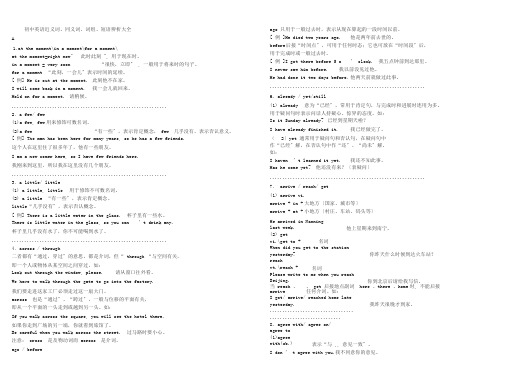
初中英语近义词、同义词、词组、短语辨析大全A1.at the moment\in a moment\for a moment\at the moment=right now" 此时此刻 ", 用于现在时。
in a moment = very soon “很快,立即〞 , 一般用于将来时的句子。
for a moment “此刻,一会儿〞表示时间的延续。
[ 例] He is out at the moment. 此刻他不在家。
I will come back in a moment. 我一会儿就回来。
Hold on for a moment. 请稍候。
.............................................................2.a few/ few(1)a few, few 用来修饰可数名词。
(2)a few “有一些〞,表示肯定概念,few 几乎没有,表示否认意义。
[ 例] The man has been here for many years, so he has a few friends.这个人在这里住了很多年了,他有一些朋友。
I am a new comer here, so I have few friends here.我刚来到这里,所以我在这里没有几个朋友。
.............................................................3.a little/ little(1) a little, little 用于修饰不可数名词。
(2) a little “有一些〞,表示肯定概念。
little “几乎没有〞,表示否认概念。
[ 例] There is a little water in the glass. 杯子里有一些水。
There is little water in the glass, so you can ’t drink any.杯子里几乎没有水了,你不可能喝到水了。
专升本辅导同义词近义词课件

• immerse, dip, duck, plunge, submerge 这些动词均有“沉浸,浸入”之意。 immerse: 侧重全部被液体所覆盖,也可用 于比喻意义。 dip: 指部分地、暂时地或轻微地放进液体, 多暗示一种谨慎或试探性的动作。 duck: 指把头伸进水中,或指游泳时开玩笑 地把一个人的头按入水中。 plunge: 暗示迅速而有力的动作,但浸入不 一定很深。 submerge: 指长时间的完全浸入、潜入, 强调浸入液体深层。
• idle, lazy 这两个形容词均有“闲散,懒惰”之意。 idle: 通常指不忙,无事可干,一般不含应 责备之意。 lazy: 指好逸恶劳,贪闲偷懒,或不愿学习 或工作等,常含应受责备之意。
专升本辅导同义词近义词
• immediately, instantly, presently, directly, shortly, soon, at once, right away 这些副词或副词词组均有“立刻,马上”之意。 immediately: 指做完一件事后,立即就做另一件 事,中间一般没有明显的时间间隔。 instantly: 指恰恰就在此刻,一秒钟也没耽误。 presently: 指不久、即将。 directly和immediately同义,指毫无迟疑。 shortly和soon同义,指动作发生或完成的速度之 快。 soon: 常用词,指行动快,完成速度快。 at once: 口语中常用,语气强烈,指时间紧迫, 一刻也不能耽误。 right away: 主要用于美国英语,语气稍弱于at once,强调动作迅速。
专升本辅导同义词近义词
• idea, concept, conception, thought, notion, impression 这些名词均有“思想、观点、观念”之意。 idea: 最普通常用词,几乎适用于任何方面的思维 活动。 concept: 指从众多实例中通过概括、归纳而形成 的对事物本质、全貌及其内部联系的概念或看法。 conception: 通常指个人或一些人所持有的具体概 念或念头,也可指概念的形成过程,含一定的想 象和感情色彩意味。 thought: 指以推理、思考等智力活动为基础的心 理思维活动及其结果。 notion: 指的是一种模糊的,变化的莫测的想法, 无可靠的基础,未经深思熟虑的观点。 impression: 指外部刺激在思想中所产生的印象。
一成不变的近义词同义词反义词字词解析
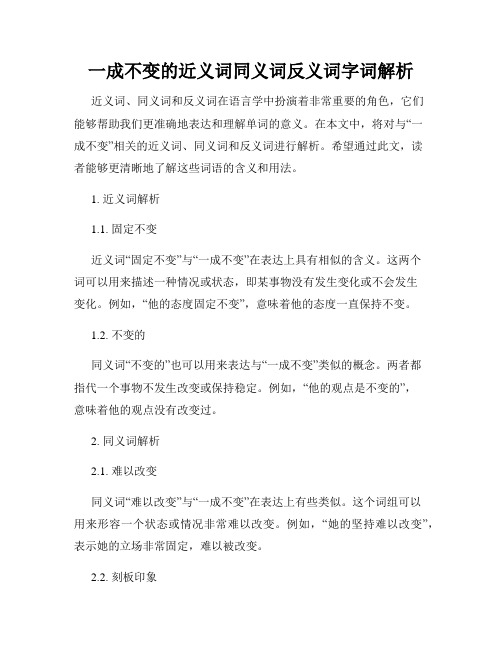
一成不变的近义词同义词反义词字词解析近义词、同义词和反义词在语言学中扮演着非常重要的角色,它们能够帮助我们更准确地表达和理解单词的意义。
在本文中,将对与“一成不变”相关的近义词、同义词和反义词进行解析。
希望通过此文,读者能够更清晰地了解这些词语的含义和用法。
1. 近义词解析1.1. 固定不变近义词“固定不变”与“一成不变”在表达上具有相似的含义。
这两个词可以用来描述一种情况或状态,即某事物没有发生变化或不会发生变化。
例如,“他的态度固定不变”,意味着他的态度一直保持不变。
1.2. 不变的同义词“不变的”也可以用来表达与“一成不变”类似的概念。
两者都指代一个事物不发生改变或保持稳定。
例如,“他的观点是不变的”,意味着他的观点没有改变过。
2. 同义词解析2.1. 难以改变同义词“难以改变”与“一成不变”在表达上有些类似。
这个词组可以用来形容一个状态或情况非常难以改变。
例如,“她的坚持难以改变”,表示她的立场非常固定,难以被改变。
2.2. 刻板印象同义词“刻板印象”也可以与“一成不变”相关联。
这个词组常用来形容对某人或某事的固定和不变的看法。
例如,“他对他人的刻板印象令人失望”,表示他对别人的看法非常固定且缺乏变化。
3. 反义词解析3.1. 多变的反义词“多变的”恰好与“一成不变”相反。
它表示某事物或情况具有频繁的变化或不稳定性。
例如,“他的心情多变”,表示他的心情经常发生变化。
3.2. 变化多端反义词“变化多端”也可以与“一成不变”形成鲜明对比。
它意味着一种非常多样化和变化频繁的状态或情况。
例如,“市场的竞争形势变化多端”,表示市场竞争形势总是在不断变化。
总结时常见的近义词有:固定不变、不变的;同义词有:难以改变、刻板印象;反义词有:多变的、变化多端。
这些词语可以用于描述一个事物或情况的状态是否改变,以及对某人或某事持有的观点是否固定。
通过运用这些词语可以使语言更加丰富多样,并帮助我们准确地表达自己的意思。
初中英语近义词、同义词、词组、短语辨析大全 同义词辨析 第2组

初中英语近义词、同义词、词组、短语辨析大全同义词辨析第二组:1. many, much, a lot of(lots of),plenty of, a number of,a good(great)dealof﹡many用来修饰可数名词,表示数目,反义词为few。
如:There are many apples in the basket.篮子里有许多苹果。
﹡much用来修饰不可数名词,表示量,反义词为little。
如:I’m sorry to give you so much trouble.真对不起,给你添了这么多的麻烦。
﹡a lot of(lots of)既可修饰可数名词又可修饰不可数名词。
修饰可数名词时可与many换用;修饰不可数名词时,可与much换用。
如:A lot of(Lots of)people think so.很多人都这样想。
﹡plenty of意为“足够”、“许多”、“大量”,它既可修饰可数名词又可修饰不可数名词。
如:I didn’t hurry because I had plenty of time.我没有匆忙,因为我有足够的时间。
﹡a number of修饰可数名词的复数形式,它修饰的词作主语时,谓语动词用复数形式。
它意为“有些”时可与some换用;意为“许多”时,可与many,a lot of,plenty of换用。
如:I have a number of letters to write. 我有一些信要写。
﹡a good (great) deal of 只用于修饰不可数名词,可与much 换用。
它修饰的词作主语时,谓语动词用单数形式。
如:I spent a great deal of time (in)doing my homework.我花费了相当多的时间做家庭作业。
..........................................................................2. spend,take,cost,pay﹡spend的宾语通常是时间、金钱。
专四近义词辨析总结
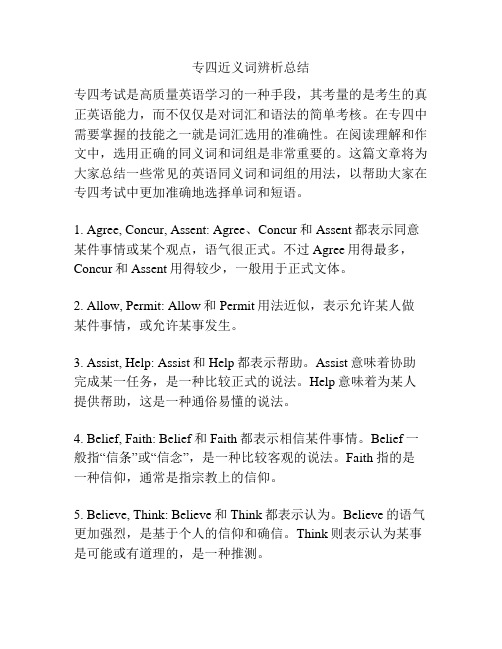
专四近义词辨析总结专四考试是高质量英语学习的一种手段,其考量的是考生的真正英语能力,而不仅仅是对词汇和语法的简单考核。
在专四中需要掌握的技能之一就是词汇选用的准确性。
在阅读理解和作文中,选用正确的同义词和词组是非常重要的。
这篇文章将为大家总结一些常见的英语同义词和词组的用法,以帮助大家在专四考试中更加准确地选择单词和短语。
1. Agree, Concur, Assent: Agree、Concur和Assent都表示同意某件事情或某个观点,语气很正式。
不过Agree用得最多,Concur和Assent用得较少,一般用于正式文体。
2. Allow, Permit: Allow和Permit用法近似,表示允许某人做某件事情,或允许某事发生。
3. Assist, Help: Assist和Help都表示帮助。
Assist意味着协助完成某一任务,是一种比较正式的说法。
Help意味着为某人提供帮助,这是一种通俗易懂的说法。
4. Belief, Faith: Belief和Faith都表示相信某件事情。
Belief一般指“信条”或“信念”,是一种比较客观的说法。
Faith指的是一种信仰,通常是指宗教上的信仰。
5. Believe, Think: Believe和Think都表示认为。
Believe的语气更加强烈,是基于个人的信仰和确信。
Think则表示认为某事是可能或有道理的,是一种推测。
6. Compel, Oblige: Compel和Oblige都表示强迫某人做某事。
Compel的语气比较强烈,有时也暗含负面意味。
Oblige则比较正式,强调基于道德或法律义务的需要。
7. Distrust, Mistrust: Distrust和Mistrust都表示不信任。
Distrust的语气较强烈,有时意味着完全不信任,而Mistrust则较为温和,可能表示有所怀疑但并非完全不信任。
8. Explain, Elaborate: Explain和Elaborate都表示解释。
初中英语近义词、同义词、词组、短语辨析大全 同义词辨析 第8组

初中英语近义词、同义词、词组、短语辨析大全同义词辨析第八组:重要词组短语1.see sb. off意为“为某人送行”。
例如:①I saw him off for Beijing yesterday.我昨天送他动身到北京去。
②Mary saw him off at the bus station.玛丽把他送到汽车站。
2.注意下列短语的用法by bus 乘汽车by train 乘火车by air 乘飞机by boat 乘船by land 陆路by sea 水路on foot 步行在上述短语中,名词前不用冠词,但在ride in a bus/car(乘坐汽车)和take a bus/taxi短语中则要用冠词。
\\\ 3.say“Hi”to的含义say“Hi”to相当于say hello to,是一种常用的问候语。
其构成形式为动词+名词+介词。
另外类似的还有:say good-bye to向……告别say sorry to向……致歉say yes/OK to同意……say no to不同意take care of关心,照料pay attention to注意例如:①Let\'s drive over there in the afternoon and say hello to him.我们下午开车去向他问好。
②You must pay attention to what you hear on the tape.你一定要注意你听到的录音。
4.see sb. doing sth. 意为“看见某人做某事”see 为感官动词,通常可跟动词-ing形式或不带to的不定式作宾语。
常见的感官动词还有:hear,watch,notice,observe等。
例如:①I saw him walk up the hill.我看着他继续上山(动作的全过程)。
②I saw him walking up the hill.我看见他正在上山。
同义词和近义词

同义词和近义词1.accept receivereceive 意为收到,不管接受与否;accept 表示同意、愿意接受。
He received valuables,but did’nt accept them. 他们收到了贵重物品,但没有接受。
2.accompany attendaccompany 表示对等的关系,指与社会地位平等的人相伴;attend 表示主从关系,指陪伴社会地位比自己高的人。
He accompanied his classmate to visit the Imperial Palace. 他陪着同学游览故宫。
Bodyguards attended the President to visit the Great Wall. 警卫陪同总统游览故宫。
3.accuse chargeaccuse 指控告的事不是很严重,常与of 连用;charge 指控告的事情很严重,往往带有正式的法律控告之意,常与with连用。
He was accused of stealing food the restaurant . 他被指控从饭店偷食物。
He was charged with murder. 他被指控有谋杀罪。
4.admite confessadmite 指必须或被迫公开承认事实;confess 指对承认的错误或罪行有忏悔之意,错误或罪行也较admit 严重。
The student admitted that he cheated in the examination. 这个学生被迫承认在考试中作弊。
The prisoner has confessed his crime of fraud. 囚犯已承认犯有诈骗罪。
5.admission admittanceadmission 指允许进入公共场所,还有门票和入会费的意思;admittance 指允许进入私人或公共场所,但常用在否定词语中。
Admission to the museum is by tiket only. 凭票才能进入博物馆。
近义词词语大全

近义词词语近义词词语大全近义词,是指词汇意义相同或相近的词语,如“美好”和“美妙”、“懒惰”和“怠惰”、“枯萎”和“干枯”、“宽敞”和“宽阔”。
与“近义词”意思相近的词为“同义词”。
以下是小编帮大家整理的近义词词语大全,欢迎大家分享。
近义词词语1哀愁——哀伤哀求——恳求爱好——喜好爱护——保护爱惜——珍惜爱戴——拥戴爱慕——羡慕安定——稳定安静——宁静安慰——欣慰安详——慈祥昂贵——珍贵遨游——漫游翱翔——飞翔傲慢——骄傲懊恼——烦恼懊悔——后悔奥秘——奥妙把握——掌握霸占——强占摆设——陈设摆脱——解脱败坏——破坏拜访——访问榜样——模范表率——典范包庇——袒护宝贵——珍贵保持——维持保存——保留保护——保卫保重——珍重抱怨——埋怨暴露——显露暴躁——急躁卑鄙——卑劣卑贱——卑微悲哀——悲伤悲凉——凄凉背叛——叛变奔波——奔走奔放——豪放奔驰——奔跑本质——实质笨重——沉重逼迫——轻视逼真——真切鄙视——轻视闭塞——堵塞边境——边疆变革——变更辩护——辩解辨别——辩认别致——新颖波动——动摇博得——获得猜测——猜度猜疑——怀疑才干——才华残暴——残酷残破——残缺差别——差异诧异——惊异崇拜——崇敬崇高——高尚宠爱——溺爱创造——发明慈爱——慈祥聪慧——聪明粗暴——粗鲁打搅——打扰担心——担忧带领——率领淡薄——淡漠胆略——胆识低沉——低落凋谢——凋落短促——短暂断定——判定对付——应付躲避——躲藏恶果——后果发挥——发扬烦躁——焦躁繁荣——繁华繁重——繁忙近义词词语2慈祥──慈爱飞翔──翱翔详细──具体每天──天天赛过──胜过好像──似乎闻名──著名满意──满足新居──新房捕获──捕捉海疆──海域天涯──天边结实──坚固遇到──碰到轻巧──轻便整齐──整洁证明──证实评比──评选注意──注重供应──供给辛苦──辛劳认识──熟悉预报──预告舒畅──愉快立刻──连忙突然──忽然四周──四面精彩──出色笨重──粗笨直立──竖立听从──服从绝技──特技附近──四周惊叹──赞叹柔美──优美洒脱──潇洒疾驰──奔驰奇丽──秀丽淘气──调皮著名──闻名震惊──震动预测──猜测特殊──特别小扣──轻敲相宜──适宜毕竟──究竟陶醉──沉醉苏醒──清醒恬静──舒适寄居──借居恐惧──惧怕轻微──稍微仍旧──仍然清晰──清楚哀求──请求贵重──珍贵挺秀──挺拔抚摸──抚摩特别──特殊依赖──依靠纯熟──熟练幽静──清幽陌生──生疏安顿──安置挽救──拯救天涯──天际颤动──颤抖自在──安闲打扮──妆扮管理──治理判断──判定捕获──捕捉温和──暖和惊奇──惊异简朴──简单增援──支援关键──要害疲劳──疲惫惊疑──惊奇审视──审阅愣住──停住眺望──远望防备──防御抵挡──抵抗挖苦──讥讽疑惑──迷惑夸耀──炫耀轻蔑──轻视强盛──强大侮辱──欺侮严肃──严厉清澈──清亮打扰──打搅形状──外形悄悄──静静温和──温顺暴躁──急躁灌溉──浇灌淹没──沉没冲毁──冲垮灾害──灾难胜负──胜败气愤──生气告别──离别如果──假如准备──预备耀眼──刺眼光芒──光线美丽──漂亮洁白──雪白惊奇──惊异中央──中心宽阔──宽广矗立──耸立优美──美丽新颖──新奇庄严──庄重挣脱──摆脱常常──经常敏捷──灵敏摇晃──摇摆立刻──立即抵抗──反抗周围──四周舒服──舒适笑容──笑脸茂盛──繁茂长处──优点诚实──老实注意──留意高兴──兴奋打碎──打坏用心──专心著名──有名准确──正确训练──练习严肃──严厉容易──轻易智慧──聪明气魄──气势雄伟──宏伟凝结──凝聚偶尔──偶然舒展──伸展生机──生气掠过──擦过奇特──奇异安谧──静谧温暖──暖和战役──战争情谊──友谊刚强──坚强侦探──侦察看守──看管焦急──焦虑崎岖──坎坷温和──温顺劫难──灾难防备──预防无端──无故祭祀──祭奠允许──答应希奇──希罕家景──家境严峻──严重思索──思考镇定──镇静严峻──严肃糟蹋──糟践奇怪──希奇掌握──把握犹如──如同徐徐──渐渐凝视──注视环游──周游模仿──模拟吓唬──恐吓疲倦──倦怠惬意──舒服兴趣──爱好痛快──愉快继承──继续赏给──赐给挚友──好友感触──感慨寻常──平常信奉──信仰宣布──公布相称──相当违背──违反惊讶──惊奇赠送──赠予充满──布满特殊──非凡海内──国内垂头丧气──没精打采全神贯注──聚精会神纤尘不染──一尘不染无边无涯──无边无际迷迷糊糊──模模糊糊情不自禁──不由自主赏心悦目──心旷神怡斗志昂扬──意气风发。
寻找的同义词和近义词

寻找的同义词和近义词大部分词组有它的近义词和反义词,那么对于“寻找”这个词,它的近义词是什么呢?反义词又是什么呢?下面是小编给大家带来的寻找的同义词和近义词_寻找的反义词是什么,以供大家参考,我们一起来看看吧!寻找的同义词和近义词探求 [注释]1.探索寻求。
摸索 [注释]探索;寻求:摸索门径|暗中摸索。
探索[注释]探寻求索:用志不专,探索不精|我想用无言的话去探索她的心。
追求[注释]①竭力寻找或探索:追求真理|追求名利地位|他一生都在追求着光明。
②特指向异性求爱。
搜寻 [注释]1.搜索;寻找。
搜索 [注释]仔细查找;搜寻:搜索前进|搜索残敌。
探寻 [注释]1.探索寻求。
寻觅 [注释]1.寻求;寻找。
寻求 [注释]寻找探求:寻求真理。
找寻 [注释]1.寻找。
2.找岔子。
物色[注释]①形状:衢巷栋宇,物色惟旧。
②景色;景象:新安道中物色佳。
③用品;物品。
▼寻找的反义词迷失 [注释]1.弄不清方向,走错道路。
2.丢失;丧失。
丢失 [注释]遗失:~行李ㄧ~文件。
抛弃 [注释]丢弃;扔掉:抛弃旧观念。
遗弃[注释]①丢掉;放弃:笨重物品带不走,全都遗弃了。
②不履行赡养或抚养亲属的义务。
▼用寻找如何造句1. 冬天快到了,小松鼠急急忙忙的出门去,寻找过冬的粮食。
2. 明智的人决不坐下来为失败而哀号,他们一定乐观地寻找办法来加以挽救。
莎士比亚3. 从绝望中寻找希望,人生终将辉煌。
4. 在这个世界上取得成就的人,都努力去寻找他们想要的机会,如果找不到机会,他们便自己创造机会。
5. 牵牛花的果,像盏盏小灯,向下垂着,好像在寻找适宜的地方,然后把种子弹落,让它在那里安家。
6. 在人生的旅途中,都要寻找快乐,以微笑面对人生。
身处困境的时候,要想着前方胜利的曙光;面对失败,要想着失败是成功之母;面对成功,不要太得意忘形;面对失望,学会忘记,学会回忆快乐时光。
7. 黑板给了我黑色的眼镜我去用他寻找文明。
8. 牵牛花的果,像盏盏小灯,向下垂着,好像在寻找适宜的地方,然后把种子弹落,让它在那里安家,到春天,再长出绿色的小生命。
词语分类:分类相似的词语

词语分类:分类相似的词语引言:词语分类是语言学中的一个重要研究领域,通过对词语的分类能够帮助我们更好地理解和运用语言。
本文将介绍几种常见的词语分类方法,并通过具体的例子来说明分类相似的词语。
一、词性分类1.名词名词是表示人、事物、地点、概念等具体或抽象事物的词语,如:人、家、树、爱情等。
名词可以进一步分为可数名词和不可数名词,形容词化名词等。
2.动词动词是表示动作、状态或存在的词语,如:走、看、存在等。
动词可以分为及物动词和不及物动词,以及各种时态、语态等形式。
3.形容词形容词是表示人、事物的性质、状态、特征的词语,如:美丽、高大、聪明等。
形容词可以用来修饰名词或者作为表语。
4.副词副词是修饰动词、形容词、副词等其他词语的词语,如:快速地、非常、很等。
副词可以表示时间、方式、程度等不同的意义。
5.代词代词是代替名词或名词词组的词语,如:我、你、他、这、那等。
代词可以分为人称代词、指示代词、疑问代词、不定代词等。
二、词义分类1.同义词同义词是指义近而音形不同的词语,如:美观和漂亮、笑和笑容。
同义词可以增强表达的准确性和多样性。
2.反义词反义词是指义相反的词语,如:黑和白、善和恶。
使用反义词可以对事物进行对比和描述。
3.近义词近义词是指意思相近但用法不同的词语,如:买和购买、快乐和愉快。
通过对近义词的使用,可以使语言更加丰富和生动。
4.词组词组是由两个或多个词语组成的固定搭配,如:大海捞针、一石二鸟。
常见的词组包括成语、俚语、谚语等。
三、词源分类1.中文词源中文词源指的是词语的起源和演变过程,包括古汉语、方言词、外来词等。
例如,汉字的演变和不同地区的方言词汇。
2.外来词外来词是指从其他语言借入的词语,如:咖啡、手机、巧克力等。
外来词丰富了汉语的词汇资源,也反映了文化交流和发展。
四、词法分类1.单音词和复音词单音词是由一个音节构成的词语,如:书、狗、爱。
复音词是由两个或多个音节构成的词语,如:飞机、大象、高兴。
初中英语近义词、同义词、词组、短语辨析大全 I-L

初中英语近义词、同义词、词组、短语辨析大全I/J/K/L从I......................................................................1. interesting / interested这是两个由动词interest转化而来的分词形容词,现在分词表示进行,表示主动意义,过去分词表示完成,表示被动意义,因此:(1)物作主语时,表语要用-ing形容词。
如:The news is interesting.这消息是有趣的。
(2)人作主语时,表语要用-ed形容词。
如:I am interested in the book.我对这本书感兴趣。
..........................................................................2.in all/ at all/ of all/ after all这些含有all 的短语的意义与all 的本意无关,极易混淆。
(1)in all“总计、总共”,在句中作状语There are 60 students in our class in all.我们班共有60个学生。
(2)at all“全然,根本不”,一般用于否定句中加强语气。
She doesn’t like football at all. 她一点也不喜欢足球。
(3)after all “毕竟、终究、到底”,一般置于句首或句尾作状语。
After all, he is a child.毕竟,他还是个孩子。
They finished the work after all.他们最终完成了工作。
..........................................................................3.in time/ on time/ at times(1)in time 指“及时”,表示动作“在规定时间内”或提前发生。
初中英语近义词、同义词、词组、短语辨析大全 同义词辨析 第14组
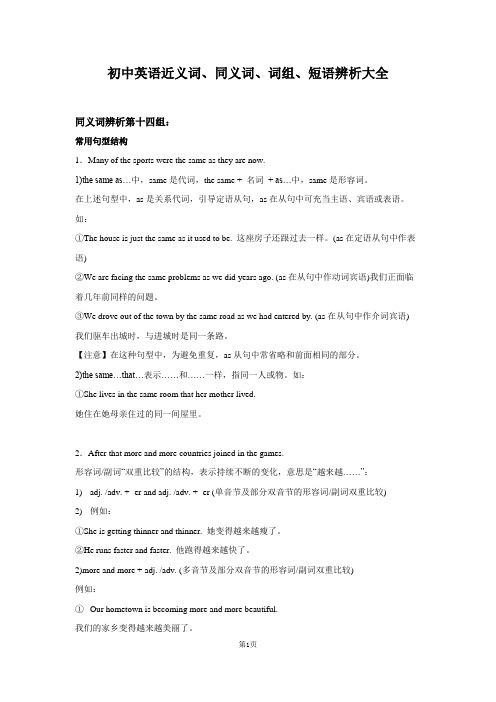
初中英语近义词、同义词、词组、短语辨析大全同义词辨析第十四组:常用句型结构1.Many of the sports were the same as they are now.1)the same as…中,same是代词,the same + 名词+ as…中,same是形容词。
在上述句型中,as是关系代词,引导定语从句,as在从句中可充当主语、宾语或表语。
如:①The house is just the same as it used to be. 这座房子还跟过去一样。
(as在定语从句中作表语)②We are facing the same problems as we did years ago. (as在从句中作动词宾语)我们正面临着几年前同样的问题。
③We drove out of the town by the same road as we had entered by. (as在从句中作介词宾语) 我们驱车出城时,与进城时是同一条路。
【注意】在这种句型中,为避免重复,as从句中常省略和前面相同的部分。
2)the same…that…表示……和……一样,指同一人或物。
如:①She lives in the same room that her mother lived.她住在她母亲住过的同一间屋里。
2.After that more and more countries joined in the games.形容词/副词“双重比较”的结构,表示持续不断的变化,意思是“越来越……”:1)adj. /adv. + -er and adj. /adv. + -er (单音节及部分双音节的形容词/副词双重比较)2)例如:①She is getting thinner and thinner. 她变得越来越瘦了。
②He runs faster and faster. 他跑得越来越快了。
2)more and more + adj. /adv. (多音节及部分双音节的形容词/副词双重比较)例如:①Our hometown is becoming more and more beautiful.我们的家乡变得越来越美丽了。
- 1、下载文档前请自行甄别文档内容的完整性,平台不提供额外的编辑、内容补充、找答案等附加服务。
- 2、"仅部分预览"的文档,不可在线预览部分如存在完整性等问题,可反馈申请退款(可完整预览的文档不适用该条件!)。
- 3、如文档侵犯您的权益,请联系客服反馈,我们会尽快为您处理(人工客服工作时间:9:00-18:30)。
同义、近义词、词组同义、近义词、词组范围很广,涉及到各种词类,我们在以上有关章节中已谈到这方面的内容,这里我们仅举数例同义、近义词、词组的辨析。
1.likely,probable,possible1)likely意为"很可能的";probable一般指有"较大的可能";possible仅指"有可能",不管可能性大小。
例如:His election is possible,but not probable.(他有可能当选,但是可能性不大。
)The police concluded that the probable(not possi-ble)cause of the fire had been a cigarette butt.(警察得出结论,火灾很可能是由烟蒂引起的。
)She is likely to succeed.(她很可能成功。
)2)likely之后常跟不定式,也可接从句,而probable之后通常接从句,不跟不定式。
possible作表语时,主语用it,或something,一般不用人作主语。
例如:He is likely to come.It is likely that he will come.It is possible that I might be of some use in that part of the work.注意以下句型:It is likely/probable+that clause sb./sth.+be+likely+不定式3)likely,probably,possibly作副词时,含义和用法略有不同,likely多和most或very连用;probably=most likely,意为"很可能"。
He may possibly succeed.(他或许会成功。
)含有"不会成功"的意味较多。
2.lost,missing,gone1)lost用于修饰物时是"丢失了的"之意。
例如:a lost pen,one's lost youth;用于修饰人时是"迷途的"之意。
例如:a lost child2)missing有"失踪的,行踪不明的"之意,因此,"小孩失踪"应用missing。
修饰物时,意为"缺少的,不在的"。
例如:There is a page missing from this book.3)gone意为"离开的"。
例如:He is gone.也可作"丧失的,用光的"解。
例如:His hair was nearly all gone.All his money is gone.3.illness,sickness,disease1)illness指患病的状态。
例如:She died after a long illness.2)disease指具体的某一疾病。
例如:Many diseases are caused by bacteria.They were more likely to die from childhood diseases.3)sickness通常指"身体不适",或者"呕吐、恶心"等。
例如:Does the doctor know what his sickness is.He felt a wave of sickness come over him.4.calm,quiet,silent,still1)calm指天气、海洋等时,表示一种无风无浪的"平静";指人时,表示镇静平和的心情。
例如:He remained calm.After the storm the sea was calm again.2)quiet指没有动静,没有噪音,尤指没有骚动的安宁状态。
例如:Everything was quiet.Keep quiet.3)silent用于事物时,侧重没有声响;用于指人时,强调少言寡语。
例如:That's a silent film.Why do you keep silent.4)still侧重于"不动"、"静止"时,与calm,quiet,silent不能替换;侧重于"无声"时,可与quiet替换。
例如:Please keep still while I take a photo of you.How still(quiet)everything is!5.pleased,pleasant,pleasing,pleasure1)pleased指外物作用于感官,使人感到"高兴、满意、喜欢",常见的结构为:be pleased+不定式或从句,be pleased with,be pleased at (about)。
例如:I'm very pleased with the performance.We're pleased about (at) your success.I'm quite pleased that she has got such a good chance.2)pleasant意为"令人愉快的,舒畅的,非常好的,讨人喜欢的,风趣的"。
例如:They spent a very pleasant afternoon in the hills.Spring weather is pleasant.He talked in a pleasant way.3)pleasing指某物或某人"使他人高兴、招人喜爱"。
例如:These flowers are very pleasing.The girl has pleasing manners.4)pleasure是名词,指"快乐,愉快的事,乐趣"。
例如:It's a pleasure to meet you.May I have the pleasure of dancing with you.6.beach,coast,shore,bank1)beach和shore均可指"海滨"。
比较而言,beach指较为平坦、覆盖着沙子或碎石、适宜于游泳与日光浴的"沙滩,海滩"。
shore则是笼统的说法,指毗邻大片水的陆地,既可以包括beach,也可以指岩石突兀或陡峭的岸边。
另外,shore也可以表示"湖边"。
例如:Early in the morning we went to the beach to see the sunrise.Many people were lying on the beach,bathing in the sun.The hotel lies on the shore of the West Lake.2)coast指海洋与陆地的分界线,意为"海岸,海岸线",是一个地理术语。
例如:She lived ten miles from the coast.China has a long coast from north to south.3)bank表示毗邻河流的任何陆地、河流或运河的"河岸"。
例如:Trees are planted along the banks of the canal.7.at first,first of all,first1)at first=at the beginning,表示"当初,起初(但后来……)",与后来发生的事相对照。
例如:At first I didn't want to go,but I soon changed my mind.2)first of all(或first)表示"首先";"最重要的",说明顺序,是时间上或一系列行动的开始,后面往往接next,then等。
例如:First of all,open the windows.Then turn off the gas and,if necessary,call an ambulance(救护车).I'll have to finish my homework first.3)first还有"第一的"、"最先的"的意思。
例如:January is the first month of the year.Who was the first man to fly across the Atlantic.8.most,mostly,almost,at most1)most或most of是"大多数的,大部分的,几乎全部的"之意,相当于nearly all,前面不用冠词;但most of 后名词前必须加冠词。
例如:Most people think as I do about the matter.Most of the students had left when he came.2)mostly(副词)"主要地,多半地",相当于mainly。
例如:He uses his bike mostly for going to school.The students are mostly young people between the ages of sixteen and twenty.3)almost意为"几乎",相当于very nearly。
例如:He spent almost the whole day reading English.4)at most意为"最多",相当于not more than,与at least相对。
例如:I can pay only twenty dollars at (the) most.[同义、近义词、词组] 高考语法综合练习从A、B、C、D中选出能够替换句中划线部分的选项。
1.He kept silent for a certain reason.A.a kind ofB.of courseC.certainlyD.some2.From time to time he went to visit Grandma.A.Some timeB.SometimeC.Some timesD.Sometimes3.I am a little tired.A.a bitB.a bit ofC.notD.some4.He is double my age.A.as old as I amB.older than IC.two years old than I amD.twice as old as I am5.At times she makes mistakes when she speaks English.A.In timeB.On timeC.Now and thenD.At the same time参考答案1.D2.D3.A4.D5.C从A、B、C、D中选出能够替换句中划线部分的选项。
